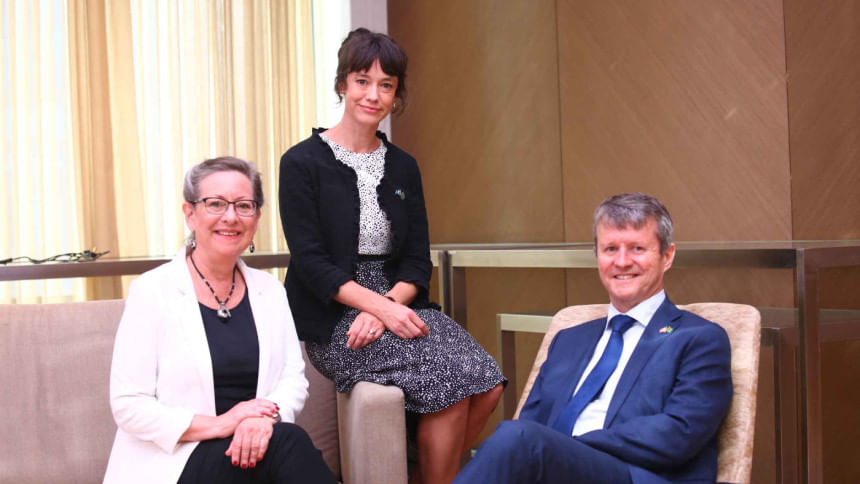50 Years of Bangladesh-Nordic Partnership: Past, Present, Future

This year marks 50 years of a long and strong friendship between Bangladesh and the Nordic countries of Denmark, Norway and Sweden. The Nordic countries followed the struggle for freedom by the Bangladeshi people and simultaneously recognised the independent and sovereign nation of Bangladesh on February 4, 1972. Since then, our joint journey has taken us far, and as reliable partners and friends, the Nordic countries have stood by Bangladesh's side through challenges and successes.
From the very beginning and during its early decades, Bangladesh was one of the top recipients of development assistance from the Nordic countries. It started with humanitarian aid and then moved into development cooperation, creating long-lasting results and multifaceted impact. Our development partnership has covered a wide range of sectors and has been a key pillar of our relationship. It has contributed to fostering strong and sustained economic development and poverty reduction in Bangladesh.
Over the last decades, relations between Bangladesh and the Nordic countries have matured and broadened. We want to continue this vibrant partnership by joining forces to tackle the global challenges of today. Topping the list is countering the negative effects of climate change. As one of the most climate-vulnerable nations, Bangladesh has been a pioneer in managing the risks of natural disasters. The Nordic countries are proud to have been supporters in preventive measures, such as flood forecasting, cyclone shelters and disaster management. We commend Bangladesh's journey towards climate resilience and will continue to support adaptation and mitigation efforts, as well as promoting decarbonisation and green transition, by bringing climate-smart solutions to the country.
The importance of a sustainable and green transition in sectors such as water, energy, connectivity and digitalisation, smart urban cities, and waste management will continue to be a priority for the Nordics. We are known for our ability to combine economic growth with pursuing the reduction of carbon dioxide emissions and energy consumption, as well as the sustainable use of natural resources. Nordic companies provide well-tested green solutions. The Nordics seek to share lessons learnt and our experience of sustainable economic growth with Bangladesh. Marine resources and Blue Economy are other areas with scope for closer cooperation. We also foresee increased partnerships in fields, such as environment-friendly high-tech extraction of coastal and ocean resources, shipbuilding and recycling, and development of port facilities. In light of Bangladesh's graduation from LDC status, the four countries are becoming well-positioned to expand their close cooperation within these sectors.
Already, more than 100 Nordic companies do business in Bangladesh. This is a further signal of a dynamic partnership in transition. The volume of trade and investment between Bangladesh and the Nordic countries has grown steadily over the years, and we are seeing an increased interest in expanding our overall business relations. Some of the Nordic investments and imports have gone beyond business purposes and helped empowering millions of people (e.g. Grameenphone, H&M, and Arla).
The Nordics consistently stress the importance of gender equality and women's empowerment, a priority that we share with Bangladesh. We have seen women in the RMG industry, a sector where important Nordic companies are active, contribute greatly to the economic development of the country. Investing in women's economic empowerment is not only the right thing to do, but also smart and profitable. For decades, the Nordic countries have worked with Bangladesh to explore ways of strengthening gender equality, including ensuring women's rights, combating gender-based violence, accessing livelihoods and education, as well as improving health and nutrition. Our efforts have contributed to positive advancements, but more needs to be done. We look forward to continuing our cooperation in addressing social norms, power structures, and the root causes of gender inequality and discrimination.
Respect for democracy and human rights are cornerstones of the Nordic societies and permeate all areas of our foreign policies. We are convinced that democracy offers the best foundation for a sustainable society. A democratic, inclusive, and equal society based on the rule of law provides opportunities for all to achieve their full potential. Upholding human rights complements and reinforces democracy in building a just and stable society. Also, in this area we will continue to work with the Bangladesh government and civil society.
The Nordic countries are three relatively small countries, but among the keenest supporters of multilateralism, global solidarity and international law. We share this ambition with Bangladesh. This is also why the Nordic countries strongly support Bangladesh in its efforts to ensure the basic needs and rights of the Rohingya refugees. In addition to providing humanitarian aid to the refugees, the Nordic countries have extended their diplomatic support for Bangladesh in its efforts to ensure a dignified, safe, and voluntary repatriation of the Rohingyas to Myanmar when conditions allow.
The Bangladesh-Nordic partnership reflects our common ambition to reach international goals pertaining to multilateralism and sustainability and jointly achieving the 2030 Agenda. The Nordic countries are thus well-placed to remain valuable partners to Bangladesh, to ensure sustainable development in all three pillars of sustainability: economic, social and environmental.
Reflecting on the past 50 years, we are all excited to continue our joint journey with Bangladesh—for the coming 50 years and beyond.
Winnie Estrup Petersen is the ambassador of Denmark to Bangladesh.
Espen Rikter-Svendsen is the ambassador of Norway to Bangladesh.
Alexandra Berg von Linde is the ambassador of Sweden to Bangladesh.

 For all latest news, follow The Daily Star's Google News channel.
For all latest news, follow The Daily Star's Google News channel. 



Comments